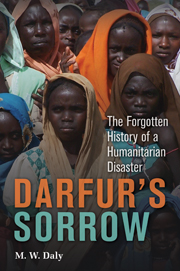Book contents
- Frontmatter
- Contents
- List of Figures
- Preface to the Second Edition
- Acknowledgments
- Chronology of Events
- Maps
- 1 The “Abode of the Blacks”
- 2 Lords of Mountain and Savanna
- 3 The Ends of the Turkish World
- 4 Darfur at the End of Time
- 5 Between an Anvil and a Hammer
- 6 “Closed District”
- 7 Unequal Struggles, 1939–1955
- 8 Colonial Legacies and Sudanese Rule, 1956–1969
- 9 Darfur and “The May Regime,” 1969–1985
- 10 Third Time Unlucky
- 11 The State of Jihad
- 12 The Destruction of Darfur
- Glossary
- Abbreviations in the Bibliography and Notes
- Notes
- Bibliography
- Index
4 - Darfur at the End of Time
The Mahdiyya, 1885–1898
Published online by Cambridge University Press: 05 August 2012
- Frontmatter
- Contents
- List of Figures
- Preface to the Second Edition
- Acknowledgments
- Chronology of Events
- Maps
- 1 The “Abode of the Blacks”
- 2 Lords of Mountain and Savanna
- 3 The Ends of the Turkish World
- 4 Darfur at the End of Time
- 5 Between an Anvil and a Hammer
- 6 “Closed District”
- 7 Unequal Struggles, 1939–1955
- 8 Colonial Legacies and Sudanese Rule, 1956–1969
- 9 Darfur and “The May Regime,” 1969–1985
- 10 Third Time Unlucky
- 11 The State of Jihad
- 12 The Destruction of Darfur
- Glossary
- Abbreviations in the Bibliography and Notes
- Notes
- Bibliography
- Index
Summary
THE MAHDI OF ISLAM
By the 1880s, Egypt's empire had become an expensive nuisance. Reeling from the pressure of its European creditors, the Khedival government had begun a process of withdrawal from its most distant possessions in Equatoria. Costly wars with Ethiopia had ended in failure. Annexation of Darfur had not halted the slave trade but had added greatly to Egypt's financial burden. Discontent, born of various grievances, simmered in the towns of the Nile valley, while in far-flung outposts, where government failed even to provide security, authority had been openly defied. In the absence of any overarching identity, however, the idea of a general rising of the heterogeneous “Sudanese” would have been fanciful, until 1881, when a leader arose to unite them.
Sunni Islam, like Judaism and Christianity, carries within it a concept of messianic deliverance from the evils of earthly existence. Elements of that concept may be seen as survivals of older religious traditions and as accretions as Islam spread. These elements have been buttressed by Traditions (sing. hadith) of the Prophet Muhammad and Ali b. Abi Talib that seem to foretell the circumstances of deliverance and the attributes of its agent. By the time of Ibn Khaldun (1332–1406), disparate ideas had coalesced into a doctrine of the Mahdi, or divinely guided one, who would restore justice, unite the Muslims, and signal the end of the world.
- Type
- Chapter
- Information
- Darfur's SorrowThe Forgotten History of a Humanitarian Disaster, pp. 60 - 86Publisher: Cambridge University PressPrint publication year: 2010



